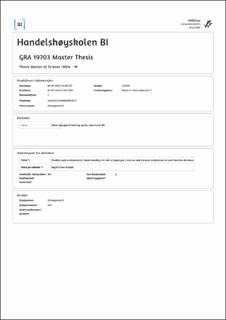Flexible work environments: Understanding the role of employee’s motives and personal preferences in work location decisions
Master thesis
Permanent lenke
https://hdl.handle.net/11250/3107852Utgivelsesdato
2023Metadata
Vis full innførselSamlinger
- Master of Science [1621]
Sammendrag
As the trend towards flexible work environments continues to grow, gaining a
deeper understanding of the underlying motives and personal preferences driving
employees' decisions regarding work location becomes increasingly crucial. This
study aims to delve into these influential factors using a qualitative research
approach. Our findings reveal how employees choose working arrangements that
suits the nature of their tasks, conducting concentration tasks at home and tasks
that require discussion and cooperation at the office. Further, employees choose
their working environments based on their preferred extent of social interactions,
seeking relaxation in the home environment and social interactions and belonging
in the office environment. Also, home office arrangements seem to better facilitate
work-life balance, despite the downside of increased boundary-setting challenges.
Finally, we found that showing dedication was crucial for employees. When
working from home this manifested in behaviors such as digital presence and
availability, even working when they were sick. We also discovered that
dedication and commitment served as a significant motive for employees to attend
the office. Maintaining a physical presence was perceived to enhance positive
evaluations and create opportunities. We applied the theoretical framework of
self-determination theory, job crafting, work-life balance and presenteeism in our
discussion of the findings. Our findings can offer knowledge to organizations
about the significance of understanding employees' needs and desires, enabling to
create tailored work environ
Beskrivelse
Masteroppgave(MSc) in Master of Science in Leadership and Organizational Psychology - Handelshøyskolen BI, 2023
